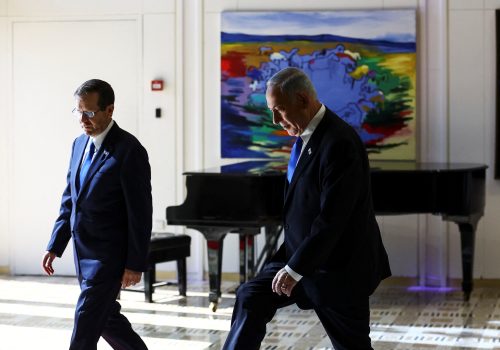What’s next for Israel’s judicial clash
JUST IN
It’s a supreme test. Amid mass protests and warnings from Washington, Israel’s Knesset today passed a controversial law limiting the Supreme Court’s power to curtail government decisions. Prime Minister Benjamin Netanyahu’s coalition has sought reform of the court’s “reasonableness” standard for months, but the bill is already under legal challenge as protests continue. What are the implications for Israel’s security and diplomacy? From Jerusalem to Washington, our experts are weighing in on the state of democracy in Israel.
TODAY’S EXPERT REACTION COURTESY OF
- Jonathan Panikoff (@jpanikoff): Director of the Scowcroft Middle East Security Initiative and former deputy US national intelligence officer for the Near East
- Carmiel Arbit (@c_arbit): Nonresident senior fellow in the Middle East programs and former director of strategic engagement at the American Israel Public Affairs Committee (AIPAC)
- Shalom Lipner (@shalomlipner): Jerusalem-based nonresident senior fellow in the Middle East programs and former advisor to seven Israeli prime ministers
Why it matters
- As soon as it was passed, the bill was challenged in court—and the Supreme Court could decide on its fate in the coming months. Jonathan, who was traveling in Israel last week, says insiders there are divided on how the court will rule, but if it tosses out the law, the decision “would create the equivalent of a constitutional crisis.”
- It’s a “constitutional” crisis with many faces—not least because Israel has no written constitution. If the law goes through, “the impact will be most acutely felt by women and minorities,” Carmiel tells us. “In a country that lacks a constitution, the Supreme Court has been a critical buttress, preventing the passage and implementation of laws that would allow Israel’s ultra-religious parties to tyrannize its majority secular population.”
- Netanyahu, Shalom tells us, faces a choice of whether to follow through on his pledge to build consensus or push ahead quickly with the agenda of his right-wing coalition, including additional judicial reforms. He “will have to decide whether he’s ready to impose limits on [coalition members’] demands, with the potential cost of losing his premiership.” Meanwhile, members of the protest movement will have to decide whether to act on their threats to boycott the Israel Defense Forces, move assets abroad, or even leave the country.
- This “reasonableness” controversy is only “the tip of an iceberg” of the debate over Israel’s “Jewish and democratic character,” Shalom adds.
Security matters
- Military service has become a major flashpoint, with some ten thousand Israel Defense Forces reservists reportedly suspending their volunteer service.
- Jonathan says that officials he spoke to while in Israel last week “almost unanimously expect military personnel to show up and serve in the event of an attack by Hezbollah or Palestinian militants, supported by Iran.” But at the same time, “Tehran is almost certainly closely monitoring the situation, delighted by internal Israeli division and eager to try to take advantage of the situation if it can.”
- The heated debates are turning into a “zero-sum game” with no room for compromise, Shalom adds. “With sacred cows such as military service in elite units being slaughtered now by the herd, the damage which Israelis are threatening to inflict upon their own society could put the entire national enterprise in grave peril.”
What Washington thinks
- In Carmiel’s view, the reforms “kneecap seventy-five years of democratic values that have preserved Israel as both a Jewish and democratic state and fortified it as a critical, and arguably the only, democratic US ally in the region.”
- And the heat in Washington will only rise. “At some point, sustained disagreements over policy can lead to a weakening in the relationship between even the closest of allies,” Jonathan notes. “And few issues are more fundamental to the US-Israel relationship than being rooted in core democratic principles.”
- Carmiel says to keep on eye on “the far left in the US Congress, “whose disaffection with Israel continues to grow. And they will continue to pressure the Biden administration to take action in kind.”
Further reading
Mon, Jul 24, 2023
What Israel’s vote on ‘reasonableness’ means for its future
New Atlanticist By
The Knesset has approved the first part of a judicial overhaul that curbs the Supreme Court's power over government appointments and plans. Atlantic Council experts share their insights on the issue.
Mon, Jul 17, 2023
At risk of separating, can Israel and the US renew their vows?
MENASource By Shalom Lipner
President Joe Biden is rolling out the red carpet for his Israeli counterpart, Isaac Herzog, who arrives in the United States on July 18.
Wed, Feb 1, 2023
Netanyahu’s coalition isn’t built to last: Expect high sparks within and fragile prospects for Israel’s incoming government
Issue Brief By Shalom Lipner
Competing agendas between the members of Israel's incoming government portend another unsustainable partnership.
Image: Protesters take part in a demonstration against Israeli Prime Minister Benjamin Netanyahu and his nationalist coalition government's judicial overhaul by the Knesset, Israel's parliament, in Jerusalem, July 24, 2023 REUTERS/Ronen Zvulun


